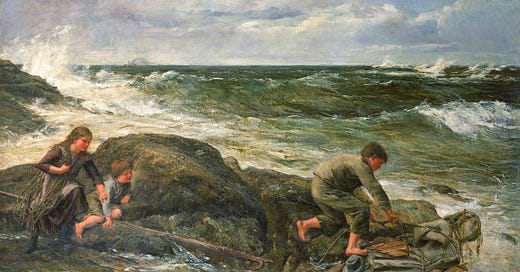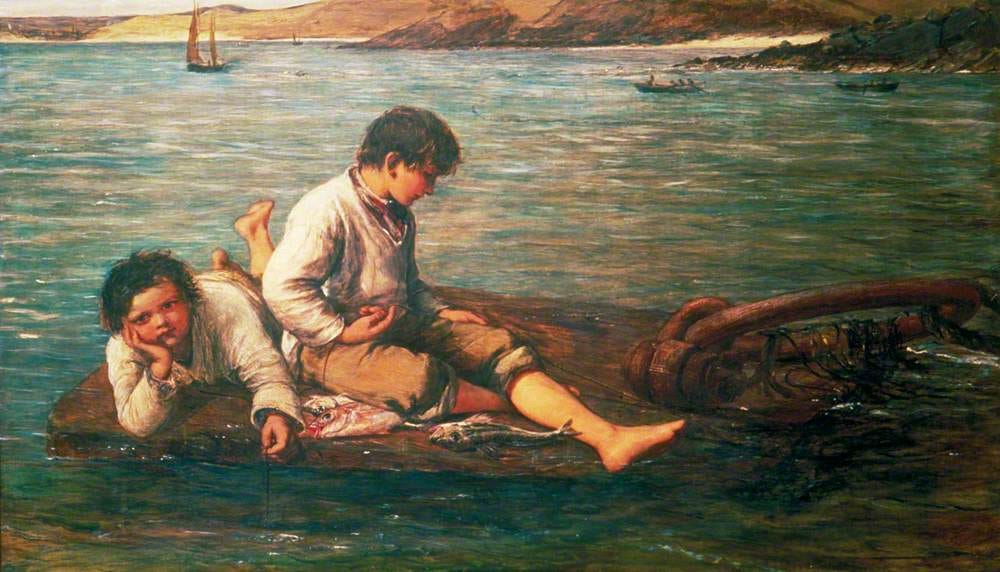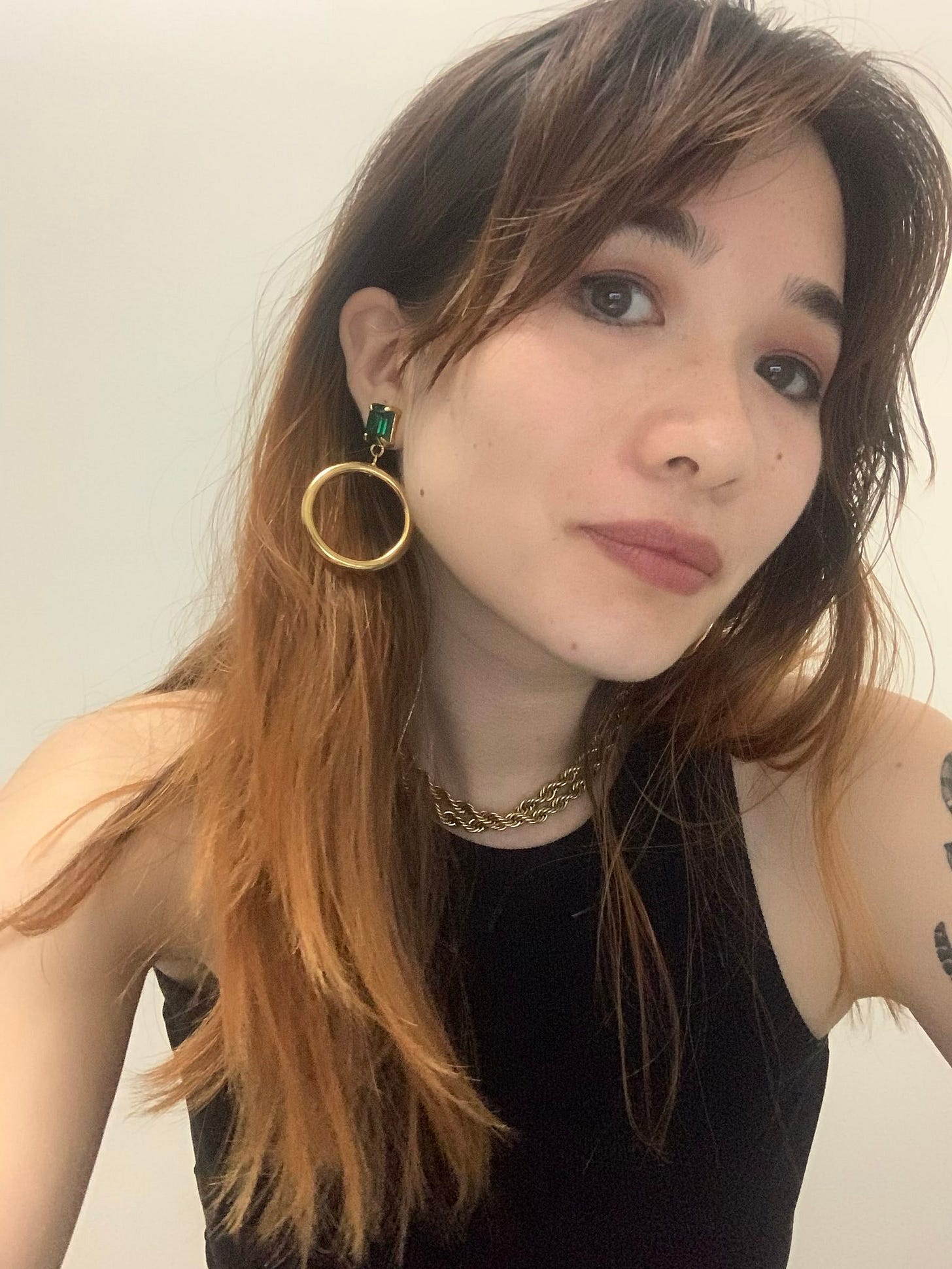This month, The Orange & Bee are publishing a traditional tale collected and translated by Katie Langloh Parker, a reading roundtable hosted by Carina Bissett, and new works by Rebecca Peng, Suzanne Willis, and Nadia Born.
Today’s piece—a story with sand in its teeth and hope in its gills—is a short story by Rebecca Peng in which some young folk dream of discovering a mermaid beached on the shore near their home.
We are grateful to our paying subscribers, who allow us to keep publishing new works, essays, and much more throughout the year. If you haven’t already, please consider signing up or giving a gift subscription.
Our side of the sea
by Rebecca Peng
Just after March, there was a credible mermaid sighting. Thomas Duncan, who kept up the old lighthouse, swore on his mother’s grave that he’d seen a flash of green and gold out on the north shore.
We spent the spring like everyone else, wading waist deep in the grey churn of salt and sea spray, our feet slipping on submerged rock, our hands going white-numb from cupping cold water, as though we might panhandle the waves, sift tideswell from fin. The last time a mermaid beached, she had been treated as a saint: staked, sawed, and spiked. Her scales had been ground down into fine green powder, which, mixed with milk, cured allergies, epilepsy, heart disease, and cancers. Tapers made with wicks of mermaid hair burned steady for fifty years. Her breasts and fins had been delicacies, sold off to bigger cities for wedding banquets. Her teeth could be sucked on for clear skin. Her bones warded off bad luck. At school, teenagers still tried passing off oddly shaped rocks as vertebrae, relics weighted with the promise of personal fortune, small miracles.
We were all hungry for miracles. That last stranding had been some sixty years ago, when the sea had still been green and full of fishing boats, swimming children. Only our grandparents remembered these things. They spoke of her seaweed-green tail, paraded on triumphant shoulders, and the storefronts lined with salves and lotions. The fathers who had hauled the mermaid up the coastline pried off a few palm-sized trophies; our grandparents recalled the metallic flash of scales in their friends’ hair. They had watched these fortunate families pack their old, trunk-sized lives into freshly waxed cars and drive away. The keepsakes shimmered even from great distances.
So we searched. I say we, but really there were only four of us. There was Kick and Carpenter and Cowboy and me, twenty-whatever and going nowhere, a full college education split between us. Up until then our biggest accomplishment that year, collectively, had been getting thirteen sequential skips out of a stone. We thought we might get to twenty by the end of the summer, and so we were often flicking our wrists, practicing our throws. We had minor differentiating traits—Carpenter was the tallest, Cowboy was allergic to tree nuts, superstitious, afraid of dogs—but that spring we moved as one large, many-legged organism, our eight dark eyes fixated on the sea.
All March, we patrolled freely. Kick, who was quickest, led us from vantage to vantage. Together we skirted over the low, rocky beaches and up across the shoreline’s cliff hills. Our wool sweaters became matted and sun-dulled. Our bodies sweated pungent brine. We developed a familiarity with false omens: the shape of a gull’s shadow atop the water or the dark slither of plastic debris. Any change in the weather was auspicious. If there was more wind or no wind, if there was sudden sun, or if the sky was cluttered with clouds, we interpreted each as a signal. This day might be the day.
‘When we find her,’ Cowboy said often; she was a consummate optimist. ‘When we find her, I want a car, and an apartment of my own, maybe a garden. We could grow things. Tomatoes. Cucumber. Is zucchini the same thing as cucumber?’ The sky was cloudy. The sea was still. Cowboy was bending and turning over stones in her hand. Only the fifth one was satisfactory. When she launched it into the water, it travelled eight skips.
‘With what dirt?’ Kick rolled up his sleeves. He punctuated his sentences with fistfuls of wet sand. ‘If we have mermaid money, we should all go inland. Somewhere real.’ Upon further interrogation, Kick’s definition of real hinged on having more than five restaurants, actual public transit, maybe an Arby’s, definitely a mall, but one with two floors minimum.
Carpenter wanted to reserve the mermaid’s fingernails for personal consumption. He thought they might clear his acne scars. Maybe save some for his baby sister, who was almost pretty. He had a grandfather who needed cataract surgery; it might be nice if the old man could see.
I didn’t know what I’d spend our seafall on. In my dreams, we hauled her body out from the shore to applause, maybe trumpets. People looked us all straight in the eye or asked us some questions. They touched my shoulder. They remembered my name.
We were arguing about whether eating mermaid throat would bestow a pop star’s voice, whether the trachea would be hard to chew, whether we ought to start a band in the city, and what we ought to name it, when the first body rolled onto shore.
The gulls descended fastest. It was like watching a cloud fall, sudden and solid, out of the sky. A sudden flash of winged, grey light. All our legs moved. We went scrambling after the birds, colliding with other beachcombers, joining the tide of damp sweaters and flushed limbs that all stretched towards the shadow in the sand. We thrust ourselves forward. We jabbed our elbows into their chests. Someone stepped on our hands. Someone bit our arms, and we bit theirs. We tasted blood and salt and sand and blood. When Mary Benson, a girl our age, tried to lunge out of the tangle, Cowboy pulled her hair until she screamed. Kick shoved me forward. Carpenter followed on scraped knees.
Here’s what we imagined holding a mermaid would be like: solid and warm, like sun on sand, like a hand in a winter glove, like a glove squeezed into a fist, a fist clutching a tool. Like we’d know, instantly, what to do with her, how she’d change our lives.
The body we held was not miraculous. Its grey skin was smooth and dense, like velvet. It smelled of wet dog. Worst of all, the body was shuddering. We felt the moment it stopped. When we fought the gulls back, its face was simple and familiar. We might have drawn it as children: ordinary pink mouth, ordinary felt-black nose, ordinary whiskered snout.
Half the town stood around us in a ring, bruised and embarrassed, watching the gulls fight to prod out the seal’s eyes, their feathered throats straining with malice. We removed our hands from the dead body. We rubbed our scratched elbows and wiped shell-dust off our knees while the victors beat their wings. Two of the gulls slid black pearls of vitreous jelly down their throats in large, ugly gulps.
Quietly, Carpenter slid his hand along the seal’s wet sides. Under one fin, he told us later, he felt two indented rows. The impression of an almost-human mouth.
Our beach-scrape didn’t discourage fellow mermaid hunters, it professionalized it. By April, the north shore was a series of small encampments with fiercely guarded borders. The amateur football club claimed the docks. Mary Benson shaved her head and struck a truce with seven other Marys of varying ages and noses. These diverse Marys guarded their parcel of shoreline with umbrellas, thermoses of scalding black tea, the butts of their flashlights, and the heads of their screwdrivers: any weapons the kitchen junk drawer provided. They knit together miles of brown rope in showy double-coin knots, spread it out like a picnic blanket on the sand.
On the cliffs, packs of teenagers threw their cigarettes down into the waves, craning for signs of supernatural life, or else traded smokes with the other campsites. The pub’s old regulars hauled their beers upstream from their barstools and onto lawn chairs. They hunched over impromptu fires in their matching puffer vests and moth-bitten gloves and sharpened their fishhooks, debated lures, cast down traps.
We witnessed all this from further and further away. The Marys kept pushing us back from our narrow plot of tide. We huddled together at the very edge of the north beach, sending bitter looks at the Marys’ ever-expanding net while we passed joints back and forth between our scabbed hands.
‘Maybe we’re thinking about this all wrong. Maybe mermaids are like eels,’ Kick said.
‘Like, what? She’s all electric?’
‘Electric eels aren’t true eels, philistine.’ If we couldn’t monopolize the coast, Kick was newly determined to monopolize the library. The Field Guide to Ocean Animals spread open in his lap was his first and only borrowing. ‘No, like how some eels migrate to the Bermuda Triangle, where it’s private, so we don’t know how they get all entangled and have their slimy eel babies.’
Cowboy wanted to know if the mermaid was fucking the eels. Carpenter wanted to know if the mermaid was fucking, period. I wanted to know if we had to go to the Bermuda Triangle.
‘Not to the literal Bermuda Triangle,’ Kick said, remaining suspiciously coy on the subject of mermaid sex. ‘Our town’s Z-list Bermuda equivalent. Somewhere private, away from all this.’
Which is more or less how we decided we’d learn to dive.
Six decades ago, when our grandparents’ mermaid had beached, her green body had rolled up on what was, at the time, known as the south beach, a secluded strip of sand that stared back at the main, northern shore. These days, no one referred to it as much of anything. The last time anything had happened to our town was when the Echo Argo had run aground, leaving behind an already ill-maintained gyrocompass, the remnants of a prow, and an oily translucence that no amount of half-hearted cleanup had ever expunged from the southern shore. The sand still felt slick between your toes.
Now, the south beach seemed like a sad inversion of its northern reflection. Its abandoned coastline was etched with fences and caution signs. Yellow remnants of grass and reeds were scattered like wilted funerary flowers. We clamoured over sheets of rusted red steel. The Echo’s leftover bones were piled together in irregular outcroppings that stretched into the blackened water. Their jagged edges made terrible music when they scraped together.
‘Very Bermuda Triangle,’ Kick kept saying, as if to make it true.
The water was viscous and probably cancerous, but the mermaid, Cowboy reminded us, would take care of that. There was nothing to fear. We slid down the metal ground, tentatively pressed our feet against the rocky bottom. We got used to the ooze of reeds underfoot and the cold. It was fine, as long as you kept moving. We plunged our heads underwater, held our breath. Our eyes barely stung when we opened them, so we kept them open. We swam like dogs, then seals, then dolphins, moving further and faster towards the horizon. Our hair had the green tinge of algae. Sand got stuck between our teeth, the enamel became coarse against our tongues. A fine iridescent film covered our legs; on land, our thighs squelched when we prized them apart. Habitually, I ran my hand down my neck, checking for soft new indents, nascent gills.
We took turns launching off from our makeshift pier. Squeezed our ears between our biceps, tightened our cores, bent our legs. We timed how fast we reached the seabed, how long we could hold our breath. We made plans to swim across the bay and unravel the Marys’ net knot by fancy knot.
On the rusted shore, Kick was pointing at some indistinguishable page of the field guide. We had ruined Kick’s first and last library loan. All the drawings were salt-stained, blurred by wet hands. Kick insisted it was more accurate, anyway. It made it look like the reader was viewing the animals through so many restless waves. Tonight, we were looking at a diagram of otters, their brown coats rippled with our fingerprints. If we could raft together, Kick claimed, we could sleep out in the water; we’d never have to go home.
Back into the sea. Cowboy and Kick had perfect dives, Carpenter cannonballed. When I went under, legs neatly together, it felt as natural as waking up from a dream. We were spread out in the black waves, turning over onto our backs. There was nothing to see; the sky was a moonless, grey lather of darkened clouds. We splashed blindly towards each other, reaching. Carpenter found my hand. Kick drifted into Carpenter. I felt Cowboy bob near me and stretched out towards her.
My hand was still empty when Cowboy started screaming.
Here’s what the miracle felt like: limp and forceless, stringy hair, tangled and untangling, all her salvation pieces barely held together, scales peeling into silver shells, water through our fingers, accidental, ordinary, we might have lost her, we might have mistaken her for anything else.
The miracle drifted between us. Her grey-green belly was upturned and unmoving. We encircled her like gulls. We held her arms and tail and hips and curls. We were the tide, shepherding her out of the sea.
On the shore, we pulled back the brittle hair so that we could see the mermaid’s face. Our hands shook. We were boneless before her.
She might have looked like us once; it was hard to say. Her body was swollen with seawater. At first we investigated slowly, breathing through our mouths, turning our heads away to gasp and choke. We touched the space where a nose was meant to be, skimming over the cool and colourless cheeks. The mermaid’s chin jutted skyward, prominent underbite gaping open. Her famous teeth appeared in two equally spaced rows, like a comb. Fine, yellow needles. We couldn’t imagine prizing them from her brown gums. We couldn’t imagine eating them without scraping our throats. We kept scooping flies and wasps off her decaying, white tongue. When we swallowed, we tasted the slime of her in the air. Rotten. Inedible.
Her fins were frayed and fringing. Her skin was full of little rivers, purple-red estuaries of bloated veins. Later, her chest would cave in. Later, a surgeon or butcher or scientist might reach inside, check if she had lungs. Later, if we were quick, we might salvage the meat from her arms, harvest some deep-set, still-ripe organs. Parts that could be powdered or pressed or refined. We might pull her bones from their sanguine, satiny lining; roll rib fragments in our mouths, keeping them wet while we sucked down whatever magic seeped below the skin. If we were fast, we might still be changed.
But she was so fragile, so hideous and helpless. We felt protective of her, as one would any trophy, any small animal, any infant they were conceited enough to call their own. We were afraid, too. If we breathed heavily, her scales peeled off like dandelion tufts. She was breastless. She lacked fingernails entirely. When we touched hand, her fingertips fused to ours. We pulled back and revealed a red wound of muscle underneath. Her thin palm-skin stuck to the black oil on our hands, lifeline glued to lifeline, as though she was grasping us, refusing to let go.
Only her eyes were perfectly intact, so black and shiny we thought they might have been polished. We saw our faces reflected back at us, miniature and oblong and strange.
I lay down next to the mermaid. We all did, pressing up against her sides to keep her shape. We felt the tide rise up around us, calling us back out to sea. We were five wet heartbeats of white froth, black water. We could only see the outline of our town, all its small movements. Everyone was outside. Everyone was waiting. With their knots and their hooks. With their great, oversized hopes. Their lanterns blinked all along the cliffside; from where we swam, you might mistake them for a sky full of stars.
Rebecca Peng is a writer currently pursuing a masters in creative writing at the University of Toronto. When she isn't writing, she loves to swim. She exists online at rebeccapeng.ca.









Fabulous meditation on what we humans do when we encounter the magical, which is to tear it apart. The line about the four friends moving as a “many-legged” organism was my favorite. Their urge to protect her only once her vulnerability is unavoidable is wonderfully done.
Beautiful story!